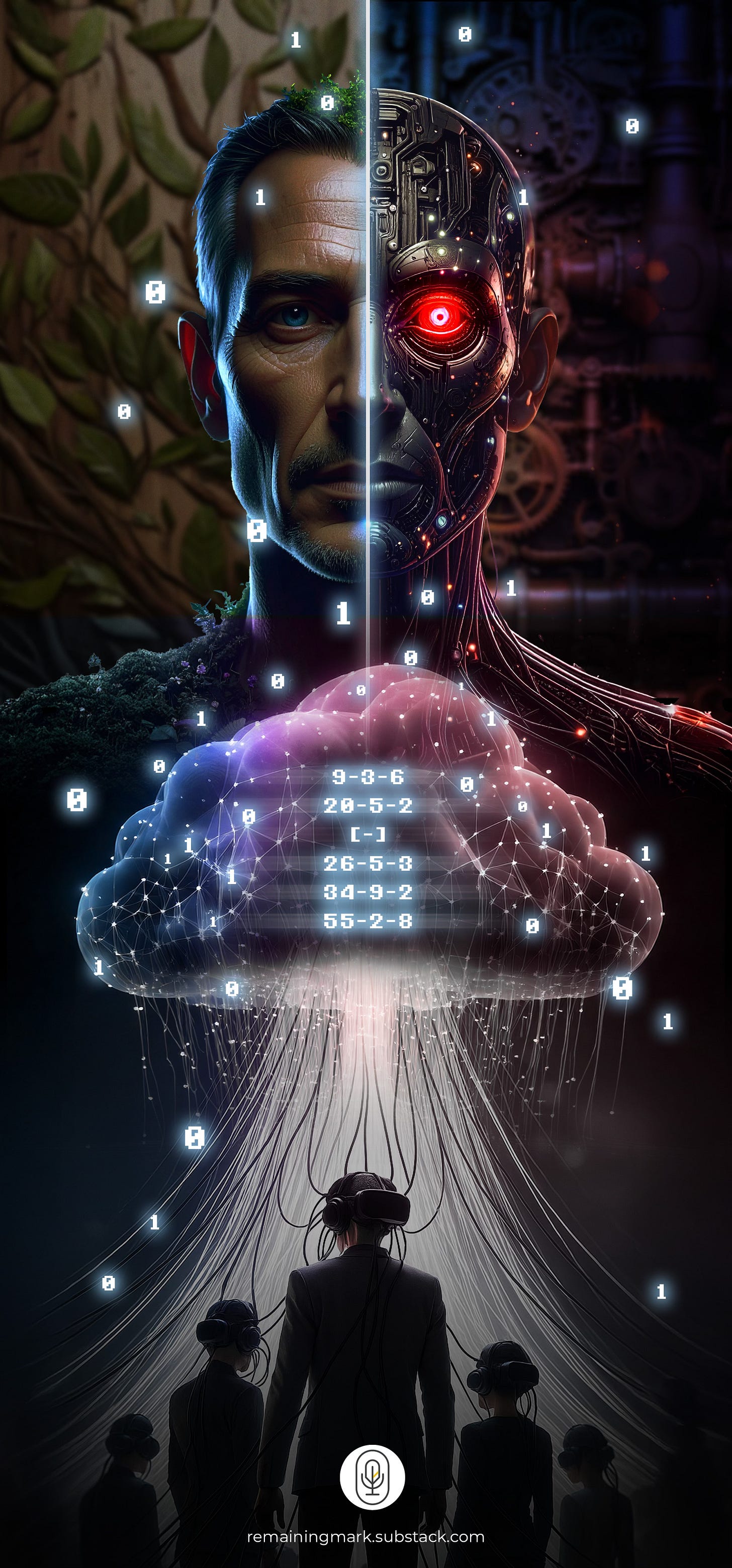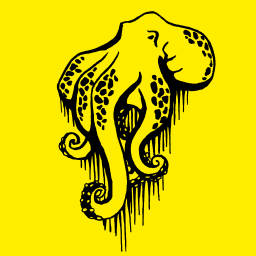Humanity, and Men With Machine Minds
Discussing the resurgence of physical ownership, and slow media

Regarding the Easter Egg: it only applies to the text body, not pulled quotes, headings, or subscription text, when viewed on desktop (i.e. not in email/mobile). Start here👇🏻
I’m fairly certain it was in early 2000 when I bought my first video game with my own money. My school had a sales fair where we could sell anything that we made ourselves, most school kids sold beverages or either sweet or savoury foods of some kind, others hosted a game or raffle; my Mom and I sold homemade fudge for R2 a piece (€0.10 for my non-South African readers), and boy did they sell like wild fire. Imagine the restraint I had to practice during the baking—I say like I baked them, Mom did 99.9% of the heavy lifting—all I did was lick the mixing beaters and the spatula, so you know, team effort.
I vaguely remember the retail price of the game being around R262, as I rolled up to buy it with R2 coins, and while I know for certain we didn’t sell 131 blocks of fudge, we did sell enough to get the majority of the way there. So between a shedload of coins, and a couple bank notes, I was happy to say that I was the proud owner of the infamous Pokemon Gold, generation two, Gameboy Colour game.
During the next couple years I played Pokemon at every opportunity I could. This included after bed time, in the car on the way to school, and even when I had friends over; we would even take turns farming experience points to level up the team. My brother had the ‘sister’ game, Pokemon Silver, and some of our friends mix and matched, so the discussion was always about whose team was stronger. And when the next generation of Pokemon came out, I was sure to buy that as well.
What really stuck with me after all these years, though, was the amount of time I sank into it, often racking up well past the 100 hour mark, before starting again to try with different starter Pokemon—the premise was that each game had edition-exclusive Pokemon, encouraging trading with the other games. The last save game I had was 192 hours long, on Pokemon Sapphire, where I caught all but 11 of the 202 available in generation 3; a proud moment for me as the remainder I would have had to get through trading (using a physical cable bought separately), i.e. not natively available on my offline cartridge.
I kept that save game well into adulthood, as well as all the other cartridges for my Gameboy Advance, even though I never played any of them again. They were mine, I worked hard to purchase them, and the memories I had with each of the games will always remind me of good times.
When 2005 rolled around, I got my first phone, and when I say “my” I mean the hand-me-down black and white brick that was collecting dust in the bottom draw. A Nokia 3310, and later, Dad’s old work phone, a Nokia 6310i; it had Bluetooth and Infrared—useless for my needs because it couldn’t store MP3—flashy features for the explicit sake of earpiece connectivity. They had pretty good games for that time, with favourites being Space Invaders and Snake, both of which came natively installed on the phones, without an additional cartridge of sorts.
As for the Internet itself, we had “access” through dial up, but back then it was of no use to me. Friends of mine were either on MySpace, stuffing around on MSN, or transitioning to Facebook, but I didn’t particularly care. When I arrived in Europe during 2008, we finally had access to proper internet that didn’t take a century to load an image, and with myself getting onto Facebook with the intention of staying in contact with friends in South Africa, I started spending more time online. At first it was just chats and the general image posting—and poking people—but became hours playing Facebook Poker, and FarmVille (both with friends), and when I discovered Minecraft, released in its Alpha stage, that ate up all my time.
It’s genius really, a world to explore, build, and create your own; more time at your desk than out in the real world. A subtle, but insidious idea—give players “control” over the in-game world, while you syphon the control over their time and presence in the real world. Many other games also incite this behaviour, a bigger name of that time would be World of Warcraft, only it was subscription based, pay monthly to play—I steered well clear of that one, recognising the pattern early and what potentially that could mean for me.
What’s dangerous here though—apart from the time sink—was that Minecraft was the first digital game I ever bought. I even remember feeling anxious about the purchase because I thought I might be scammed due to there being no deliverable. All console and PC games up till now, for me at least, had been CD based; convenient that this was tied to an account, and an accessible on more than one computer, but I had nothing physical to show for it.
Come to think of it, I reckon that was turning point for me, the convenience of digital “ownership”, as I knew that when I inevitably moved country again in a few years, I couldn’t keep taking boxes of CDs and games with me. Suppose then, gone were the days of us boys being huddled around a single computer sharing parts of the same keyboard for split screen games, taking turns on Lego Racers, or playing through Rayman together on the PS1 for the 100th time.
Let’s fast forward 17 or so years to today. Looking at my library of games and music, I can tell you that there is not a single CD anywhere to be found. Music was either ripped from our collections, or bought digitally through the Apple Store; games are now purchased on the PlayStation Store, or “freely” available through the compulsory annual subscription fee. I refuse to pay for Spotify or AppleMusic as the amount I would pay for an album every now and again, would be slightly cheaper than the monthly payment for “unlimited” access and no ads.
I really don’t want to get into this, that having access to all the music in the world for the price of a single album is a “steal” and I should be hopping on that train, but I suppose I will have to address this nonsense ideology somewhere in this piece, might as well be now.
I listen to music for enjoyment and relaxation, like practically all people, and I have favourite bands and artists that I perpetually listen to—last week I bought a new album, and have listened to pretty much nothing else, since—this notion of buying into “access to everything” is a ploy to get the money out of my account. If I listen to repeated tracks over and again, why would I continuously pay money for it? If I bought it, it should be mine to listen to, I gave you something, you gave me something. And before you say streaming services are beneficial to artists, consider Spotify pays $0.003–0.005 per stream, based off a variety of listening factors, record labels and whatever have you; as of 2024, Spotify does not pay roughly ⅔ of its track library.
Now I understand that the use of platforms like Spotify and AppleMusic are for purely streaming and not owning, but the premise of what’s considered a ‘purchase’, or even ‘rent’ on either front has been redefined without broader consideration. Take a look at the PlayStation Plus subscription, the only subscription I have that perpetuates. Taken directly from their Terms of Service:
10.1. All intellectual property rights subsisting in PSN Content, including all software, data, services, and other content subsisting in or used in connection with PSN, the Online ID and access to content and hardware used in connection with PSN belong to SIE, its affiliates, and its licensors. Use of the terms "own," "ownership", "purchase," "sale," "sold," "sell," "rent" or "buy" in this Agreement or in connection with PSN Content does not mean or imply any transfer of ownership of any content, data or software or any intellectual property rights from SIE, its affiliates or its licensors to any user or third party.
10.2. Except as stated in this Agreement, all Content provided through PSN is licensed on a non-exclusive and revocable basis to you for your personal, private, non-transferable, non-commercial, limited use on a limited number of PlayStation Devices or other devices in the country in which your Account is registered.
So, even if you purchase a game through PlayStation, you’re not owning your copy of the game itself, but rather an extended license to access it. And this is, give or take, the same sort of sale model used all over the media and entertainment industry, with others climbing on board.
I recognise there is a degree of hypocrisy in here on my end, I know, that I choose to pay for such and yet complain, where as I could just as easily pay for the CD version, and insert it manually into my PlayStation each time. But that’s also an isolated example, and in many cases, the CD would only act as the license mechanism itself, requiring the digital version in full to play—you know, because you cannot fit a 150GB game on a CD. You also cannot buy DVDs for all the new releases, as they’re say Netflix, Amazon, or Apple original, similarly, not a lot of musicians have a physical CD option—bandcamp, sure—but not tangible, unless you’re lucky enough to find a modern band on Vinyl… and have a record player.
I get it, I know. It’s convenient to have it all digitally. And I can play a wider variety of games at my ease and discretion. But none of it, despite my payment, is mine, be it through subscription, or direct purchase.
I’ve been a text-based creative almost a decade now, since my graduation. I’ve written stories, books, journals, and articles for fun, thousands of pages, and hundreds of thousands of words. My journals alone are north of 3,500 pages, and 900,000 words, excluding this year’s one. And when you bring my side projects, self published book, thesis and dissertations, as well as my career, you can add the remaining and more to top the million.
It wasn’t always like this, though, I had learning comprehension problems at school, as well as a slew of other concentration issues that meant I couldn’t follow conversation, and often lost train of thought altogether, especially when exposed to random noise. I was diagnosed with ADD—although these days, most use the blanket term ADHD, despite the lack of hyperactivity—and I had to attend a number of different classes outside of my school schedule.
These ranged from homework help with other students, to more specialised guidance from one-on-one experts. Exams were the bane of my existence, even with the extra time, quieter rooms, and years of prescribed Ritalin. I found that I liked spelling related tests, multiple choice, or ones based on logic and maths, but any time I was faced with a paragraph that I had to read, comprehend, and answer questions on, suddenly I was incapable. You can learn more on that below:
This doesn’t exactly scream writing career, word enthusiast, creative, and expressive storyteller, all things indicative of someone that goes on to become a professional copywriter. And look, I’m not saying this to shoot myself in the foot, it’s the reality of my upbringing, all of this, I taught myself to do, with help from other people along the way. Its been a super inefficient start and speed up process, but frankly, you’d have been none the wiser had I not pointed it out. It also brings a sense of relatability to my discussion, because, no doubt, you also had troubles at school, whether similar or completely different, or know someone who did.
My career in writing, however, has taken me far and wide, from sports nutrition and the ketogenic diet, to histopathology, video media, and cybersecurity across a multitude of industries. I’ve written both short and long form content, white papers, e-books, blog posts, you name it, as well as microcopy on websites and social media too. I would say that despite where I started, and where I have been ever since, I now have a solid grasp on how the public reads and engages with all written media.
And I can also say, I’m sad to see where we have arrived at. The content quality that’s available for public consumption has dropped dramatically in favour of ‘sludge’, or ’slop’, and algorithm appeasing content.
I was thinking about SEO the other day—for those unfamiliar—that stands for search engine optimisation, how you go about fiddling your content so that it ranks higher on Google (and Bing, and everywhere else you look for things, under the couch excluded). What we’re doing is optimising our content to appease an algorithm, to distribute our work to other readers within the same field, or interest. Not by means a bad thing, when used for the correct purposes, but now with the widespread use of AI, it’s no longer about humans leveraging the algorithm to reach other humans, but machine copy optimised for machine learning algorithms, spoon fed to the unaware, or uncaring humans. Its all become a bit too efficient.
While I can clearly see the use and aid of AI to help a certain substrate of writers, there seems to be a hardline divide between those who write to evoke emotion, engage connection, and bring a sense of relatability to their work, and those who will publish anything to steal your eyes away from something meaningful, be it online or off; done through algorithm spamming, keyword stuffing, and manipulative retention tactics.
Consider Instagram for a moment, have you seen any of these reels where they drum up the emotion, get you all invested, and then end off with “See Part 2 for end product”. I already invested the last 60 seconds into your shit reel, now you want me to follow your page or subscribe to see the output. Get out of here.
There’s so many examples, LinkedIn, for one is the king of ‘Shitifications’, and yes I made that term up. There are notifications for notifications, and they’re endless. From job ads, to birthdays, connections changing location, to how your post performed, skill endorsements, ‘improve your profile with AI’ and so on; apparently, LinkedIn has over 70 different types of notifications, can you believe it.
I’m getting off track a bit, but creatively written and wholesome content is struggling to retain relevance in the broader media, except for those who genuinely have a love for their craft, hidden away on smaller platforms, engaging with their audience, and discussing ideas. The vast majority of content written for ‘awareness’ is either has a hard or soft sell to steal your attention away from the competitors.
I want to read about you, the struggles you endured, and learn vicariously through your story. I want to engage and relate, to feel like we’re side by side for a moment as we venture along this path on our journey through life. Tell me the details, I’m all ears, the fun and furious, the happy and the sad. Allow me the opportunity to show you compassion, be empathetic to your experiences, and you can do the same. We can both walk away wiser, happy with our time investment and enthusiastic about our next encounter.
I don’t want to be told how to make my work more efficient. How many words the title needs to be before it truncates, whether my work has the correct ratio of inbound to outbound links, that there’s no clear call to action. So what if I don’t use the main keyword seven times, and secondary a couple more. So what if I don’t explain it clearly and use small digestible words to ensure readership for a wider audience. I’ll post my story at 02:00 if I please, not on the most popular platforms at certain times of the day.
I mean, did you see the title of my last piece, it’s deliberate, and its very me:
Allow me the freedom to be creative on my terms. I’m not here to keep you constantly engaged, you’re free to make your own choices. Retention is the thief of attention. Walk with me till you’re satiated, then divert your attention to something else that challenges you, or brings you contentment. We can walk again together in the future, perhaps you’ll bring me stories you’ve shared with others and we can discuss those too.
In fact, on that note, I’m going to get into this a bit more, pull both stories together, so if you’ve had your fill, awesome, go read something else for a bit and come back. A friend of mine has her own publication, around what it’s like to settle in to a new country as an expat. She talks candidly about her experiences and uses fun and relatable humour to get her points across, so if you need a break…
Why all this, and why now? Usually I defer from emotionally charged pieces that have a lot of media relevance, but this one stuck in my throat.
Last week I watched a YouTube video by one of my favourite visual creatives, Campbell Walker, on his channel, Struthless, titled "Internet Fatigue: why this place sucks now” where he talks at length about the shift of the digital age and resurgence of physical media. He goes into the ownership debate in more detail, and shares his insightful take on efficiency, which I will share with you below.
“Often the quest to make something as efficient as possible forgets the fact that we are the things within that system. Humans, inefficient, slow moving, flawed, emotional humans. We are the end, not the means to the end. Efficiency is only as good as the goal it serves: sprinting might make you fast, but speed isn’t going to help you if you’re heading for a cliff. Sometimes, the best thing you can do is stop, and change direction.” ~ Campbell Walker, Struthless.
And this is exactly why I wrote this piece in this manner, using my own experiences as a way to show you the humanity behind the text, and the journey that I’m walking. Similarly, with regard to inefficient and offline media, Struthless references the following quote:
“The books, CDs, and vinyl records, they form part of our extended self which then provides benefits to us. It makes us feel good about ourselves because it provides nostalgia, control, ownership, and slow media.” ~ Bodo Lang, Professor of Marketing Analytica at Massey University.
If I were to think back to my days of gaming nostalgia, it’s riddle with thoughts ‘fighting’ over whose turn it was to race next, the debacle over who scratched The Sims disc, and endless explorations through Dad’s music collection. Or playing Populous: The Beginning in turns while at a friend’s house, figuring out how to get 1990s games to run on a modern computer; getting everyone together to trade Pokemon through the physical cable, and setting up day/weekend long LAN parties to play Quake, Unreal Tournament, or other popular games back then.
The slow media extraction from Lang’s quote, would be the arduous saving up of pocket money to buy a new CD where I only knew one for the tracks; discovering songs organically as some speaker systems didn’t have proper single-track loop setting—in fact, many music shops back then had headphones that you could use to try before you buy. I didn’t come from a friend group of readers, but I did, on occasion borrow books from the library to read over the course of a week or two. Don’t remember the last time I took a book out, let alone finish one that I didn’t write myself.
Our current digital landscape across virtually all media consumption platforms is one of over efficiency with zero ownership, and perpetual payment, all the while the quality you receive diminishes. More requirements to restrict your engagement, features behind paywalls, and the corporate greed monster swallowing you whole. Microtransactions, rotating content libraries, and sneaky adverts, your attention is all that they’re after, so that they can take you for all that you’ve got, often at great personal cost.
So where does that leave us?
We really have to just stop and take a look around us. What’s happening with the artists in creative fields, writers, musicians, designers, the lot, having their work stolen to feed the machine mind. We have access to large language models that can generate anything we can think of with the push of a button—where did you think it learnt how to do that? In a large part due to its coding, and what a marvel of innovation that is, but just as importantly, from its training data which it got from freely scraping the Internet, and our work along with it.
Creative industry drama aside, a quick Google search also reveals that Americans spend on average 5h16m on their phones every day; 79% highlight the biggest culprit to be Social Media Apps, and 72% of Gen Z participants say that their mental health would improve if apps were less addicting. This is a big fucking problem. And I can tell you that those that have the power to make the adequate changes, won’t, because greed has poisoned their core, they want for nothing other than to appease their stakeholders and line their pockets.
I sheepishly admit that until last week I hadn’t heard the final speech by Charlie Chaplin in The Great Dictator in full—aside from perhaps a few clips here and there—but man, did he hit the nail on the head.
“Don’t give yourselves to brutes—men who despise you, enslave you, who regiment your lives, tell you what to do, what to think and what to feel! Who drill you, diet you, treat you like cattle, use you as cannon fodder. Don’t give yourselves to these unnatural men, machine men with machine minds and machine hearts! You are not machines! You are not cattle! You are men! You have the love of humanity in your hearts!” ~ Charlie Chaplin.
As it seems that there is nothing substantial being done about these situations—if anything, it’s getting worse—it makes the most sense to do something about it yourself. There are pockets of platforms, much like Substack to some degree, that try (and I emphasise ‘try’) to shield against AI sludge, and promote the individuality of story sharing and humanity, and these are great, but alone are not a full solution.
We are all but man, human; share ideas, connect, be compassionate, and feel the humanity in your hearts. The wake of machines has their place too, but that would be alongside us, not replacing, and certainly not feeding on us.
I myself deleted Instagram, even if for a short time, to break the doom scrolling addiction that kept me awake until 02:00 most mornings, and my phone, aside from direct messages and phone calls, is incapable of sending me notifications. That’s right, even if you Like this post—try me—I’ll only see it when I open the app, at my own discretion, as it should be. No badges, no notifications, no reminders. No app, or website should have free reign over your attention.
When I disconnect, I do so deliberately, so that I can feel better, unshackle my mind from drama in the media; day dream and enjoy the influx of new ideas and mental reflections. So often I even see people half-arsing actions, being partly present, and partly sedated; some scroll between sets at the gym, others constantly checking their phones during conversations and dinners. Put. It. Down. It’ll still be there later!
Go do one thing with intention, meaningfully. Sit and listen to a vinyl or CD, draw or paint a picture, work on your body, write, and be mindful. Do it slowly. Do it inefficiently. Do it humanely. Be present and recognise what things you own, that make up your space and home. Use your intention wisely, guide your attention towards what matters to you, and as a result, you will avoid being subjugated by retention greed.
As always, thanks for your time! If you’d like to fuel the next one, you can buy me a coffee!
Need another read?
~M.







